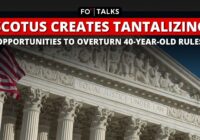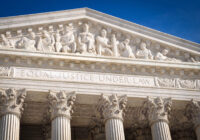On June 28, the US Supreme Court’s six conservative justices joined together in Loper Bright Enterprises v. Raimondo. They overturned the 1984 decision Chevron U.S.A., Inc. v. Natural Resources Defense Council, Inc. This case was the basis of the “Chevron deference doctrine,” under which judges were required to defer to a regulatory agency’s interpretation of the law on points that Congress had not made precise, as long as the interpretation was “reasonable.” Chevron remained one of the bedrock principles of administrative law for 40 years.
In the decision, the majority stated, “The Administrative Procedure Act requires courts to exercise their independent judgment in deciding whether an agency has acted within its statutory authority, and courts may not defer to an agency interpretation of the law simply because a statute is ambiguous; Chevron is overruled.”
The decision to overturn Chevron was split down partisan lines. The Court’s three liberal justices dissented from the majority decision, calling it an act of judicial hubris.
The Court’s overturning of 40 years of legal precedent will have far-reaching effects. While Democrats and Republicans blame each other for the coming storm, it is clear that the polarization surrounding the decision will overwhelm the legal system and lead to high-cost consequences for many businesses.
The beginning and end of Chevron
The logic behind the Chevron deference doctrine was to make regulation more effective and efficient. When Congress passed the Clean Water Act of 1972 to control water pollution, they could not define every pollutant and set safe levels for every one. So, the Environmental Protection Agency (EPA) creates the standards, policies and detailed regulations to fill the gaps.
In 1984, the Natural Resources Defense Council, Inc. (NRDC) challenged the EPA’s standards in Chevron. The DC Court of Appeals ruled in favor of the NRDC, but the Supreme Court reversed that ruling, inaugurating the deference doctrine. If the 1972 act was silent or ambiguous with respect to a specific issue, the Supreme Court decided, judges should defer to the EPA’s interpretation of the statute. This precedent soon became a foundational principle, being cited thousands of times in the following years.
Later, however, the Supreme Court has been diluting the Chevron deference doctrine. As Chief Justice John Roberts wrote, “At this point, all that remains of Chevron is a decaying husk with bold pretensions.”
In 2022, the court created the “major questions” doctrine in West Virginia v. EPA. Agencies asserting new authority with economic and political significance required a higher standard of “clear congressional authorization.” This put limits on the power Chevron gave to administrative agencies. The major questions doctrine was also the basis for striking down US President Joe Biden’s policy to forgive $430 billion of student loan debt.
Loper Bright Enterprises v. Raimondo was the final nail in Chevron’s coffin. The National Marine Fisheries Service (NMFS), a branch of the Department of Commerce, required Loper Bright Enterprises, a herring fishery, to have a third-party monitor on every boat to prevent overfishing. The government paid the salaries of the monitors. However, when the money ran out, the NMFS told Loper Bright Enterprises to pay the monitors.
The employees of Loper Bright then sued Commerce Secretary Gina Raimondo, claiming that the NMFS’ requirement was unconstitutional. Due to Chevron, the case was dismissed because the court deferred to the agency’s interpretation. However, when Loper Bright appealed, the case made it to the Supreme Court where it found several conservative justices ready to overturn Chevron.
Businesses will be hit hard
Businesses operating in the US will be affected by the overturning of the Chevron doctrine, though the exact impact and timing are not yet clear. As judicial challenges to federal regulations proceed, compliance requirements for businesses will become less predictable.
Changes could occur in several areas, including in visa regulations, workplace health and safety, equal employment opportunities and the status of independent contractors. In the longer term, a patchwork of regulations may be upheld or canceled, leading to increased ambiguity and confusion for businesses. Most importantly, judges may rule in surprising ways and along partisan lines, causing a clash between ideologies.
A practical example illustrates why the 2024 judgment is extremely consequential for consumers, businesses and the economy. After the 1929 Wall Street Crash, Congress passed the Securities Exchange Act of 1934 and created the Securities and Exchange Commission (SEC). However, since the 1934 act, the economy and financial markets became increasingly complex. Standards that applied in 1934 may not apply in today’s modern market.
Thus, legislative delegation to the SEC must sometimes be implicit, not explicit, to avoid overwhelming legislators. Chevron deference made this easier by giving the SEC the power to interpret the original act of 1934 without judicial interference. A court was not to substitute its own interpretation of the 1934 statute for a reasonable interpretation made by the SEC. However, with power to interpret taken away from the SEC, rulings on financial standards will vary from court to court.
Chevron caused ideological strife
The Court’s three liberal judges argued giving courts the right to impose their judgment on the law was simply a power grab. Conservative judges, on the other hand, took the view that the Chevron deference doctrine gave administrators too much power and prevented judges from judging.
Republicans, conservative legal scholars and business leaders in the US also favor the new judgment. The right points to bureaucratic empire-building since the creation of the modern administrative state by Franklin D. Roosevelt in the 1930s. They also claim agencies expanded their power beyond what the original legislation permitted. In 1952, Supreme Court Justice Robert Jackson even called the bureaucracy the “veritable fourth branch” of government.
Republicans believe the new decision will check left-leaning bias in federal agencies. Republicans blame Democrats for deliberately passing vague laws to exercise federal power in the name of the Democratic agenda. Left-leaning, unelected bureaucrats impose unending red tape on businesses, causing costs and delays. As such, the US economy becomes less competitive. To Republicans, bureaucrats violate the principle of separation of powers. They act like the legislature by crafting regulations. They also act like the judiciary by interpreting those regulations in their favor.
Just as Republicans complain that Democrats dominate regulatory agencies, the latter complain about the former for politicizing the courts. Supreme Court conservatives adhere to conservative jurisprudence, which is fixated based on originalism and textualism. Originalism is the principle that the constitution should be interpreted to mean what it meant at the time it was written.
Textualism is the theory that the interpretation of the law is based exclusively on the ordinary meaning of the legal text. No consideration is given to non-textual influences. Democrats see the recent originalist and textualist judgments of the Supreme Court as a result of decades of disciplined work by their Republican rivals to put conservatives on the court.
Democrats agonize about the Republican capture of the Supreme Court. After stuffing the Supreme Court with their partisan nominees, Republicans achieved major agenda itmes such as overturning Roe v. Wade (1973), putting the legality of abortion back in the hands of the states, and dismantling the US administrative state, causing “havoc in society.”
Democrats believe the 2024 Loper Bright decision created legal chaos and a crisis in governance. Democrats, administrative lawyers and legal scholars at the top US schools state that the US legal system will soon experience spectacular fireworks. On July 1, the Supreme Court’s five-three judgment in Corner Post v. Federal Reserve eliminated the statute of limitations for many challenges to administrative rules.
In her dissenting opinion, Justice Kentaji Brown Jackson warned of a “tsunami of lawsuits.” Justice Elena Kagan thought similarly regarding the 2024 decision. In her dissenting opinion, she wrote, “In one fell swoop, the majority today gives itself exclusive power over every open issue—no matter how expertise-driven or policy-laden—involving the meaning of regulatory law.”
The two decisions, Loper Bright and Corner Post, have the ability to come together to create a Brexit-style arrangement supporting conservative ideological fervor for rolling back the Rooseveltian state. The legal certainty that businesses enjoyed in the US is now threatened. Neither the bureaucracy nor the courts are prepared for the imminent tsunami of cases. In an extremely litigious society, the legal system could find itself overwhelmed.
[Cheyenne Torres and Joey McFadden edited this piece.]
The views expressed in this article are the author’s own and do not necessarily reflect Fair Observer’s editorial policy.
Support Fair Observer
We rely on your support for our independence, diversity and quality.
For more than 10 years, Fair Observer has been free, fair and independent. No billionaire owns us, no advertisers control us. We are a reader-supported nonprofit. Unlike many other publications, we keep our content free for readers regardless of where they live or whether they can afford to pay. We have no paywalls and no ads.
In the post-truth era of fake news, echo chambers and filter bubbles, we publish a plurality of perspectives from around the world. Anyone can publish with us, but everyone goes through a rigorous editorial process. So, you get fact-checked, well-reasoned content instead of noise.
We publish 2,500+ voices from 90+ countries. We also conduct education and training programs
on subjects ranging from digital media and journalism to writing and critical thinking. This
doesn’t come cheap. Servers, editors, trainers and web developers cost
money.
Please consider supporting us on a regular basis as a recurring donor or a
sustaining member.
Will you support FO’s journalism?
We rely on your support for our independence, diversity and quality.







Comment